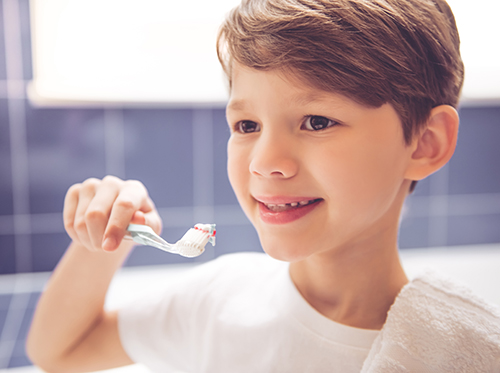May 14th, 2020

Your infant’s first teeth will begin to appear around six to 12 months of age. You might wonder how important these primary teeth really are. After all, baby teeth are destined to fall out within a few years and be replaced by a full set of permanent teeth. However, baby teeth have important functions, and proper care can set the stage for excellent oral and overall health.
Promote Better Nutrition
The appearance of your baby’s primary teeth around six to 12 months of age coincides with changes in your infant’s nutritional needs. Beginning at six months, exclusive breastfeeding is no longer nutritionally sufficient; this is the age at which you should introduce solid foods.
At six to eight months, when your baby can start to chew, strained or pureed fruits and vegetables are appropriate. As your little one’s teeth grow in and chewing abilities progress through 12 months of age, you can gradually add cereal, bread, cooked meats, and other adult foods to his or her nutritious diet.
Increase the Life Expectancy of Baby Teeth
Although baby teeth are inevitably going to fall out and be replaced by permanent ones, making baby teeth last serves an important role that can have benefits into the future. Baby teeth serve as placeholders for permanent teeth. If they decay and fall out too soon, permanent teeth are more likely to grow in crooked.
How to Take Care of Baby Teeth
Your baby’s primary teeth are already in his or her mouth at birth; they are just invisible because they have not broken through the gums. Since they are already present, your baby can get cavities if you do not practice proper oral hygiene from the beginning.
- Do not let your baby fall asleep with a bottle in his or her mouth.
- Brush your child’s baby teeth twice a day as soon as they come in.
- Floss your child’s teeth as soon as he or she has two teeth that touch.
- Visit Fairfield Pediatric Dentistry for your baby’s first checkup when the first tooth arrives.
May 7th, 2020

"Motherhood: All love begins and ends there." - Robert Browning
We would like to take this moment to thank all the great moms out there for being so great during their child’s visits to Fairfield Pediatric Dentistry. Whether it’s driving their kids to regularly scheduled appointments or for “being there” while their child is treatment, the moms who come to our office are all stellar individuals, so Dr. Brad Skelton and Dr. Richard Kennedy and our entire staff would like you to know that we appreciate you all!
Happy Mother’s Day and enjoy your special day!
April 23rd, 2020

Here is some surprising yet worthwhile advice you might be hearing for the first time: Brushing can be incredibly bad for your child’s teeth if done right after eating certain foods.
Enamel is an extremely hard mineral on the exterior of each tooth. It’s actually the hardest substance in the human body: It’s even stronger than bones! Its only weakness is that acids in the food we eat can easily destroy enamel.
Healthy teeth thrive in an environment that has the proper pH balance. That ensures the mouth doesn’t start the process of demineralization—the process when alkaline turns into acid, which attacks and softens the enamel on the surface of your child’s teeth. Pores and fissures form, and that’s when the harmful bacteria go to work.
A mouth’s pH level fluctuates depending on what is eaten throughout the day. Examples of the most common highly acidic foods include citrus fruits, soda, and sugary foods. Highly acidic foods tip the balance of pH in the mouth from a healthy alkaline to a dangerous acid.
Can brushing your child’s teeth immediately after a meal lead to even more damage? The answer is yes!
Eating highly acidic foods causes your child’s teeth to be more susceptible. If your child brushes when the teeth have been weakened by acids, even more destruction can happen to the enamel. Your child’s toothbrush bristles will actually wear away some of the enamel. So it’s healthier for your child to wait at least an hour after eating or snacking to brush.
Good preventive measures to take instead of brushing after your child eats include:
- Rinsing or drinking water
- Chewing sugarless gum
- Consuming dairy or non-acidic foods to conclude a meal
These practices help produce saliva, which in turn restores a healthy pH level in your child’s mouth and coats the teeth with minerals they need.
Once your child’s mouth is restored to a healthy pH level, he or she may brush normally. Keep in mind that acidic foods can weaken the enamel on the teeth and take the right measures to prevent spiking pH levels.
Still have questions? Call our Fairfield or Oxford office and schedule an appointment for your child with Dr. Brad Skelton and Dr. Richard Kennedy.
April 16th, 2020

Earth Day began in 1970 as an event to raise awareness of our environment. What began as a single day in April is now recognized around the world to bring attention and education to global environmental issues. Conserving our natural resources, reducing water and air pollution, and developing green technologies are all ways in which we can improve the environment around us.
Reduce, Recycle, and Reuse
One of the easiest ways to participate in Earth Day is by simply reducing the amount of refuse that ends up in landfills. Many communities have recycling programs for paper, plastic, and metal refuse. By keeping recyclable items out of landfills, we reduce the need for new disposal space and the amount of energy needed for burning refuse. Recycling products also helps conserve the resources that are used in making new products.
You can save money by reducing your consumption of many everyday products. Single disposable water bottles can be recycled but they are costly. By using filtered faucet water, you can conserve your financial resources. Disposable paper towels can also be wasteful. Consider reusable cleaning rags for the majority of your chores.
Reusing items saves both the environment and your finances. A large number of products can be re-purposed to create a new item. Old furniture can be remade into a new piece. Old clothing can be used for craft items. If you are not able to find ways to reuse your old items, donate them to a charity. Remember to continue your positive environmental steps on a daily basis.
Other things you can do to improve the environment
Everyone, young or old, can find ways to participate in improving the environment. Some ideas include:
- Planting trees
- Picking up litter
- Reducing energy consumption
- Walking, bicycling, or carpooling to work or school
- Disposing of hazardous waste properly
- Using rain barrels to conserve water for plants
Earth Day is designed to appreciate and celebrate the health of the earth. Keeping the earth healthy is important, but keeping your mouth healthy is important, too. Healthy teeth and gums contribute to your overall health and well-being, so remember to call our team at Fairfield Pediatric Dentistry to schedule an appointment. Have a happy and healthy Earth Day, from Dr. Brad Skelton and Dr. Richard Kennedy!















 Website Powered by Sesame 24-7™
Website Powered by Sesame 24-7™